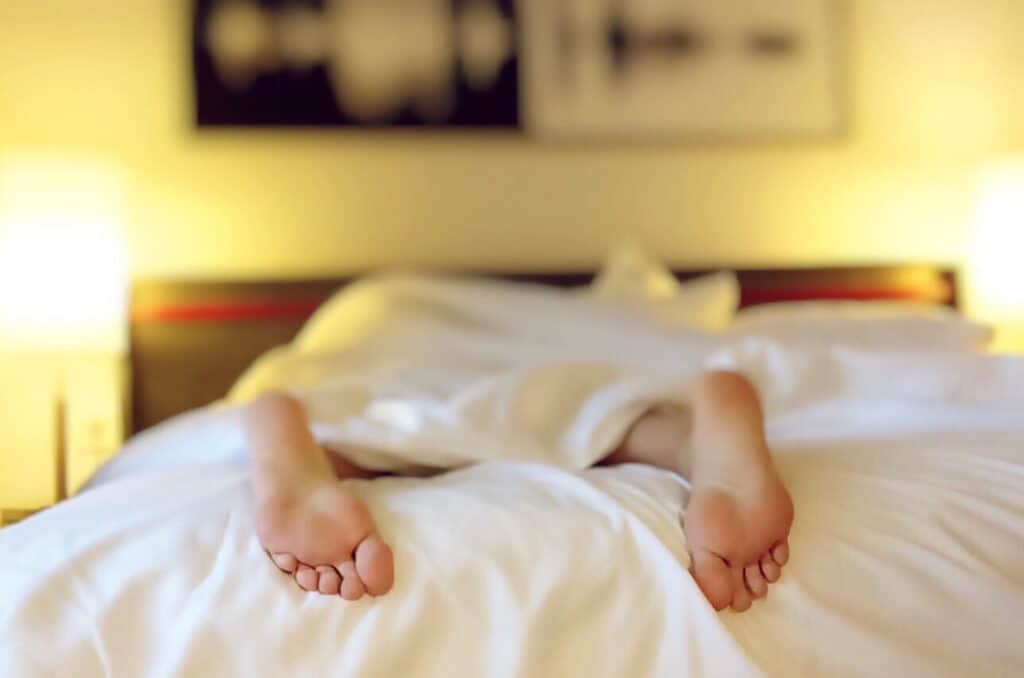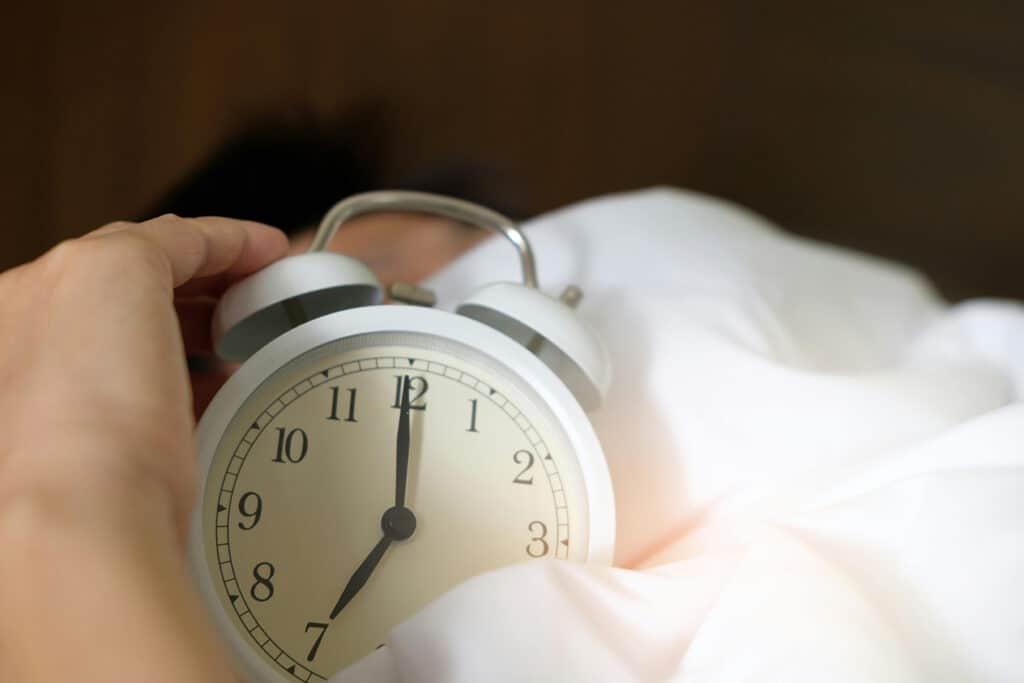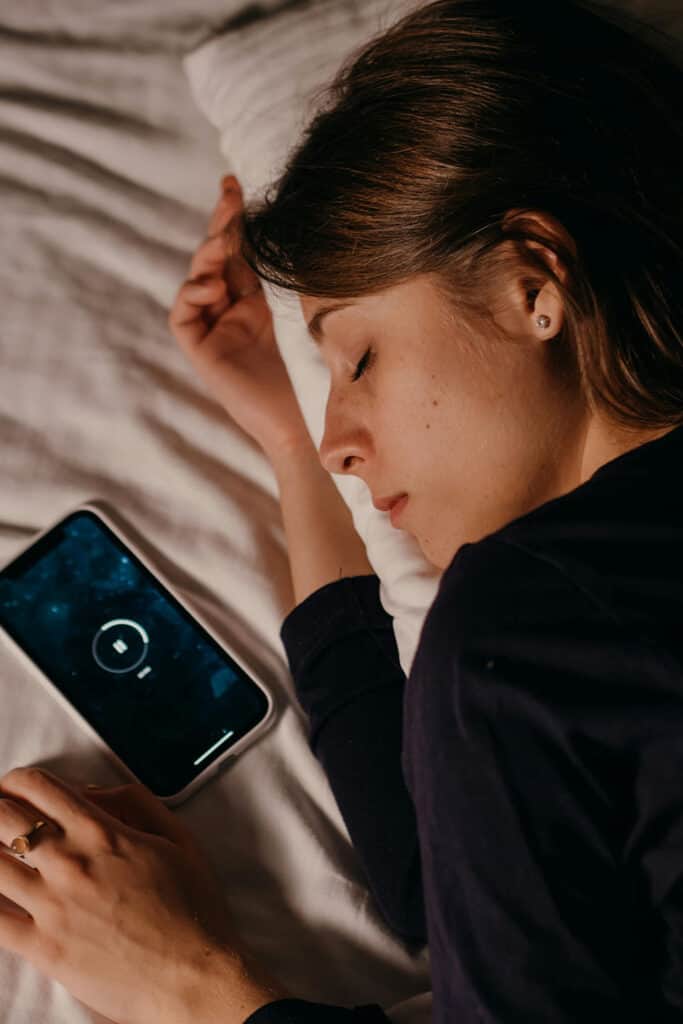

Do you find yourself tossing and turning at night, wishing you could fall asleep earlier?
As someone who values health and well-being, you understand the importance of a good night’s sleep. Yet, achieving an early bedtime can seem elusive amidst the distractions of modern life.
At Life Tree Planner, we recognize the challenges you face in trying to establish a consistent sleep schedule. With our expertise in sleep science and holistic wellness, we’re here to guide you toward mastering the art of sleeping early.
In this article, we’ll explore the benefits of early sleep and provide practical tips to help you transition to a healthier sleep routine. From creating a relaxing bedtime routine to managing stress effectively, we’ll cover everything you need to know to improve your sleep quality and achieve an earlier bedtime
Ready to reclaim your nights and wake up refreshed? Keep reading to discover how you can cultivate the habit of sleeping early and enjoy the benefits of a well-rested mind and body.
By following our expert advice, you’ll be on your way to falling asleep earlier, feeling more energized during the day, and enhancing your overall quality of life.
- Importance of Early Sleep
- Assessing Your Sleep Habits
- 1. Relaxing Bedtime Routine
- 2. Limit Screen Time Before Bed
- 3. Manage Stress and Anxiety
- 4. Avoiding Heavy Meals Before Bed
- 5. Exercising Regularly
- 6. No-Alcohol Policy Before Bed
- 7. Clear Boundaries for Balance
- 8. Sleep Disorders and Medical Issues
- 9. Establishing a Sleep Schedule
- 10. Avoiding Naps and Digital Curfew
- Celebrating Progress and Success
- How to Sleep Early: A Recap
Here are 10 techniques for sleeping early:
- Bedtime Routine: Establish a calming pre-sleep ritual.
- Limit Screen Time: Avoid screens before bed.
- Manage Stress: Practice relaxation techniques.
- Avoid Heavy Meals: Don’t eat big meals close to bedtime.
- Exercise Regularly: Stay active during the day.
- No Alcohol: Limit alcohol intake before bed.
- Set Boundaries: Prioritize relaxation over work.
- Sleep Disorders: Treat underlying sleep issues.
- Stick to a Schedule: Maintain a consistent sleep routine.
- Avoid Naps and Screens: Avoid daytime naps and screens before bed.
See also Selfcare Reminders: 10 Mindful Moments in Daily Life as a Routine
Importance of Early Sleep

Understanding the importance of early sleep revolves around honoring our body’s natural circadian rhythms. Our internal clock dictates optimal sleep quality, ensuring a good night’s sleep and overall well-being.
While someone may identify as night owl, prioritizing going to bed early is essential for aligning with our sleep-wake cycle.
The pervasive blue light exposure from screens can disrupt this delicate balance, making it challenging to maintain a consistent sleep schedule. By committing to bed earlier, individuals can regulate their sleep schedule, allowing for sufficient rest and rejuvenation.
Having a consistent sleep schedule not only improves sleep quality but also enhances overall health, cognitive function, and mood, emphasizing the profound impact of honoring our body’s natural need for early sleep.
Here are 10 reasons why early sleep matters:
- Improved Mood: Early sleep can help regulate emotions and reduce irritability.
- Enhanced Concentration: Getting enough rest improves focus and cognitive function.
- Better Physical Health: Early sleep supports immune function and overall physical well-being.
- Increased Productivity: Well-rested individuals are more efficient and effective in their tasks.
- Healthy Weight Management: Proper sleep helps regulate appetite and metabolism.
- Reduced Stress Levels: Adequate sleep lowers stress hormones, promoting relaxation.
- Improved Memory: Sleep aids in the consolidation of memories and learning.
- Balanced Hormones: Early sleep helps maintain hormonal balance, crucial for various bodily functions.
- Enhanced Athletic Performance: Quality sleep is vital for muscle recovery and performance.
- Overall Longevity: Consistent, good sleep contributes to a longer, healthier life.
Assessing Your Sleep Habits

Assessing your sleep habits is the first step toward achieving a good night’s sleep and mastering the art of falling asleep early. Begin by evaluating your current sleep schedule and routines. Are you going to bed early enough to allow for adequate rest?
Consider the impact of blue light exposure from screens, which can disrupt your ability to fall asleep earlier. Reflect on your sleep quality, are you waking up feeling refreshed? Examine your bedtime rituals and whether they promote relaxation or stimulate your mind.
Establishing a consistent sleep schedule is key, helping regulate your body’s internal clock for more restful sleep. By identifying areas for improvement and making adjustments accordingly, you can pave the way for better sleep and the ability to fall asleep earlier with ease.
Here are 10 techniques that help you to sleep early:
1. Relaxing Bedtime Routine

Crafting a serene bedtime routine is key to coaxing your body and mind into a state of relaxation, setting the stage for an earlier bedtime. By aligning with your natural sleep-wake cycle and nurturing healthy sleep habits, you pave the way for a more restful night.
Introducing calming elements like soft lighting from candles, soothing melodies of relaxing music, or a cup of herbal tea can signal to your body that it’s time to wind down. Incorporating deep meditation or breathing exercises can further quiet the mind and ease tension.
As you go to sleep earlier, you harmonize with your internal clock, promoting a smoother transition into the different stages of your sleep cycle. Following a consistent bedtime routine encourages enough nighttime sleep, ensuring you awaken refreshed and ready to embrace the day ahead.
Here are 10 options for a relaxing bedtime routine:
- Reading a Book: Helps to unwind and relax the mind.
- Taking a Warm Bath: Relieves muscle tension and soothes the body.
- Listening to Calming Music: Creates a peaceful and calming atmosphere.
- Practicing Mindfulness: Reduces stress and promotes relaxation.
- Doing Gentle Yoga: Stretches the body and relaxes the mind.
- Writing in a Journal: Clears the mind and helps process thoughts.
- Enjoying a Light Snack: Satisfies hunger without being too heavy.
- Using Aromatherapy: Calms the senses and promotes sleep.
- Light Stretching: Eases muscle tension and prepares the body for rest.
- Disconnecting from Electronics: Reduces exposure to blue light and helps signal bedtime to the brain.
2. Limit Screen Time Before Bed

Limiting screen time before bed is crucial for achieving an earlier bedtime and maintaining a healthy sleep schedule. Electronic devices emit blue light, which can disrupt your circadian rhythm and make it difficult to fall asleep.
Blue light exposure before bedtime can trick your brain into thinking it’s still daytime, delaying the release of sleep-inducing hormones.
To combat this, establish a consistent sleep routine that includes winding down without screens at least an hour before bed. Instead, opt for activities that promote relaxation, such as reading a book, practicing mindfulness, or taking a warm bath.
By limiting blue light exposure before bed, you can help your body naturally prepare for sleep and improve your chances of falling asleep earlier, without relying on sleep aids or interventions from a sleep specialist.
3. Manage Stress and Anxiety

Managing stress and anxiety before bedtime is essential for promoting healthy sleep patterns and overcoming sleep problems. Our natural circadian rhythms can be disrupted by daily stressors, making it difficult to feel sleepy earlier than our usual bedtime.
To combat this, establishing a relaxing bedtime routine can signal to our bodies that it’s time to unwind. Prioritize relaxation techniques such as deep breathing exercises or mindfulness meditation to lower stress levels and lower core body temperature, promoting faster sleep onset.
Avoiding stimulating activities and creating a to-do list for the next day can also ease worries and prepare the mind for rest.
If stress persists, consider seeking professional help to address underlying issues like sleep apnea and explore natural remedies before resorting to sleeping pills. With a consistent bedtime routine and effective stress management strategies, falling asleep faster and enjoying restful nights becomes achievable.
Here are 10 tips to manage stress and anxiety:
- Practice Deep Breathing: Calms the nervous system and reduces stress.
- Exercise Regularly: Releases endorphins and improves mood.
- Maintain a Healthy Diet: Fuels the body and supports mental health.
- Stay Hydrated: Keeps the body functioning optimally.
- Get Adequate Sleep: Ensures your body and mind are well-rested.
- Stay Connected with Loved Ones: Provides support and reduces feelings of isolation.
- Set Realistic Goals: Avoids overwhelming yourself and promotes a sense of achievement.
- Take Breaks: Prevents burnout and allows time to recharge.
- Engage in Hobbies: Provides a distraction and promotes relaxation.
- Practice Gratitude: Focuses on positive aspects of life, reducing stress.
See also The Art of Selfcare: 10 Practices of Well-Being and Wellness
4. Avoiding Heavy Meals Before Bed

Avoiding heavy meals before bed is paramount in achieving the goal of sleeping early and enjoying restorative sleep. Heavy, rich meals close to bedtime can leave you feeling uncomfortable and bloated, making it difficult to fall asleep.
Opting for a light meal or snack instead can help promote feelings of sleepiness by allowing your body to focus on digestion without feeling overwhelmed. Additionally, heavy meals can disrupt your sleep environment by causing indigestion and discomfort, leading to disturbances in your sleep cycle.
By prioritizing lighter meals in the evening and avoiding heavy, calorie-rich foods, you can create an optimal environment for falling asleep early and experiencing the rejuvenating benefits of restorative sleep.
Here are 10 light food options before bed:
- Bananas: Rich in magnesium and potassium, aiding muscle relaxation.
- Almonds: Contains magnesium, promoting sleep quality.
- Oatmeal: A good source of melatonin to help regulate sleep.
- Greek Yogurt: High in protein and contains tryptophan.
- Cottage Cheese: Protein-packed and contains casein for slow digestion.
- Cherries: Natural source of melatonin, improving sleep quality.
- Turkey Slices: Contains tryptophan and protein.
- Kiwi: High in antioxidants and serotonin, promoting sleep.
- Whole Grain Crackers: Provides complex carbs that help regulate blood sugar.
- Warm Milk: Contains tryptophan and is soothing.
5. Exercising Regularly

Regular exercise is not just beneficial for physical health, it can also significantly improve sleep quality. Establishing a consistent exercise schedule is crucial for a well-regulated sleep-wake cycle, but many individuals struggle with difficulty falling asleep or being night owls.
By incorporating exercise into your daily routine, you can reset your body clock and promote better sleep. Physical activity helps you fall asleep more easily and stay asleep throughout the night. Whether you’re a morning person or a night owl, engaging in regular exercise can help regulate your sleep time and make it easier to go to bed earlier.
Consult with a sleep specialist if you continue to have trouble sleeping, but consider exercise as a natural sleep aid to enhance your overall sleep quality and wellness.
6. No-Alcohol Policy Before Bed

Implementing a no-alcohol policy before bed can significantly aid in your quest to fall asleep early and improve sleep quality. Alcohol consumption before sleep disrupts melatonin production, crucial for regulating sleep time and initiating the transition to restfulness.
By avoiding alcohol, you support your body’s natural ability to wind down and prepare for sleep, promoting deeper and more restorative rest. Additionally, alcohol can affect your body temperature regulation, potentially interfering with deep sleep stages.
By adhering to a no-alcohol policy in the hours leading up to bedtime, you create an environment conducive to improved sleep quality and ensure you get the recommended seven to nine hours of restorative sleep each night, setting the stage for a more energized and productive day ahead.
Consulting with a sleep doctor can further optimize your sleep routine, helping you go to bed earlier and reclaim any lost sleep.
7. Clear Boundaries for Balance

Establishing clear boundaries for work-life balance is essential for achieving the goal of falling asleep early and ensuring you get enough nighttime sleep.
Research shows that prioritizing boundaries between work, personal growth and life can significantly improve sleep quality and reduce the risk of sleep disorders.
By implementing an earlier sleep schedule and creating a routine that supports winding down before bed, you can help yourself fall asleep earlier and reap the benefits of restorative rest. This practice not only enhances your well-being but also contributes to your career and wealth by boosting productivity and overall health.
By understanding the importance of setting boundaries and respecting your body’s natural sleep hormone cues, you can create a conducive environment for earlier sleep and uninterrupted nighttime rest.
Here are 10 tips on how to set clear boundaries for balance:
- Identify Priorities: Determine what’s most important in your life and allocate time accordingly.
- Communicate Clearly: Express your needs and limits to others without hesitation.
- Schedule Downtime: Block off time for rest and personal activities.
- Learn to Say No: Politely decline requests that don’t align with your priorities.
- Set Work Hours: Define specific times for work and stick to them.
- Seek Support: Lean on friends, family, or professionals for help in maintaining boundaries.
- Limit Technology Use: Create tech-free zones or times, especially during personal time.
- Delegate Tasks: Share responsibilities at work and home to avoid burnout.
- Create Personal Space: Ensure you have a dedicated space for relaxation and reflection.
- Establish Routines: Consistent daily routines help maintain balance.
8. Sleep Disorders and Medical Issues

Sleep disorders and medical issues can disrupt our ability to fall asleep faster and maintain a healthy sleep schedule. Conditions such as insomnia, sleep apnea, and restless legs syndrome can make it challenging to go to sleep early, leaving us feeling fatigued and irritable.
Sleep medicine offers solutions, from breathing exercises to prescribed medications, but understanding the underlying causes is crucial. Research suggests that disruptions in melatonin production, our sleep hormone, can contribute to sleep disorders.
Bright light exposure, especially in the evening, can also interfere with melatonin levels, making it difficult to get enough sleep.
Consulting a sleep doctor and incorporating strategies like creating an earlier sleep schedule, 10 minutes sleep meditation, deep sleeping music and practicing relaxation techniques can help address these issues and promote faster and more restful sleep.
9. Establishing a Sleep Schedule

Establishing a consistent sleep schedule is paramount for improved sleep quality and falling asleep earlier. Begin by winding down before bedtime with calming activities like taking a warm shower or enjoying a cup of herbal tea after shower meditation, as this signals to your body that it’s time to relax.
Avoiding bright lights and screens in the evening can also help regulate your circadian rhythm, promoting an earlier sleep schedule. Sleep disorders and disruptions can often be mitigated by maintaining a steady bedtime routine.
Furthermore, keeping your bedroom cool can aid in reaching deep sleep, facilitating an easier transition to sleep and a more restful nighttime slumber. By prioritizing a consistent sleep schedule, you pave the way for a more peaceful and rejuvenating night’s rest.
Here are 5 tips on how to establish a sleep schedule:
- Optimize Your Sleep Environment: Make your bedroom conducive to sleep by keeping it dark, quiet, and cool.
- Monitor Your Sleep: Keep track of your sleep patterns and adjust your schedule as needed.
- Be Patient and Persistent: It may take time for your body to adjust to a new sleep schedule, so be patient and stick with it.
- Set a Consistent Bedtime: Go to bed at the same time each night to regulate your body’s internal clock.
- Wake Up at the Same Time: Wake up at a consistent time every morning, even on weekends.
See also Self-Love Books: 12 Books Nurturing Self Love and Inner Peace
\
10. Avoiding Naps and Digital Curfew

To ensure an early bedtime and improve the quality of your sleep, it’s crucial to avoid napping during the day and set a digital curfew for electronic devices.
Napping disrupts your circadian rhythm, making it harder to fall asleep at night. By resisting the temptation to nap, you’ll be more likely to feel sleepy at your desired bedtime and drift off faster. Additionally, electronic devices emit blue light, which can suppress the production of melatonin, the hormone that regulates sleep.
Setting a digital curfew, turning off screens and activating night mode, helps signal to your body that it’s time to wind down and enter sleep mode. By prioritizing an early bedtime and avoiding electronic distractions, you’ll ensure you get enough restorative sleep for a refreshed and energized tomorrow.
Celebrating Progress and Success

Celebrating progress and success in achieving early sleep is a significant milestone on the journey to improved well-being. By implementing strategies to fall asleep fast and setting a bedtime earlier, individuals with sleep disorders or those struggling to sleep earlier can find relief.
Go to bed just a few hours earlier can have a profound impact, as exposure to bright light during the day and dimming lights before bed help you fall asleep more easily. Avoiding activities that disrupt sleep, such as screen time close to bedtime, ensures you get enough sleep to function optimally.
Following the goal to sleep early helps a healthier sleep routine and sets the stage for a more energized and productive tomorrow. Celebrate each step forward in achieving the restorative power of early sleep.
How to Sleep Early: A Recap
Incorporating simple yet effective techniques into your nightly routine can significantly aid in achieving the goal to sleep early. Consistently go to bed at the same time each night trains your body to anticipate sleep, making it easier to fall asleep fast.
Engaging in relaxation methods like breathing exercise can calm the mind and body, help you fall asleep and promoting faster sleep onset. Exposure to bright light during the day and dimming lights before bedtime help regulate your internal clock, signaling to your body that it’s time to wind down.
Prioritizing enough sleep each night is essential, especially for individuals with sleep disorder. By making these adjustments and adopting healthy sleep habits, you can successfully go to sleep earlier and reap the benefits of a well-rested body and mind.
Start tonight, and watch as your efforts to sleep early transform into a revitalized and refreshed morning routine.


